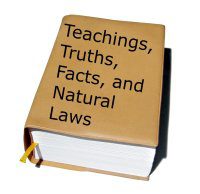To understand the meaning of dharma (Sanskrit) or dhamma (Pali), the following is the definition of explanation given in Nyanatiloka’s Buddhist Dictionary, a Manual of Buddhist Terms and Doctrines published in Sri Lanka.
“Dhamma: The ‘bearer,’ constitution (or nature of a thing), a norm, law, doctrine; justice, righteousness; quality; thing, the object of mind ‘phenomenon’ . . . The dhamma, as the liberating law discovered and proclaimed by the Buddha, is summed up in the Four Noble Truths, and it forms one of the Three Gems . . . Dhamma, as an object of mind, conditioned or not, real or imaginary.”
Dharma or dhamma, therefore, has many translations. By combining the English meaning of these words: teachings, truths, facts, and natural laws, then emphasizing the definition dependent on the nature of the subject being discussed, one can usually understand the meaning of dharma in each instance. For instance, the meaning of dharma in the Triple Gem’s “Buddha, Dharma, and Sangha” includes all of these: teachings, truths, facts, and natural laws.
In our interpretations of the Buddha’s dharma, we think of the word as a label for the teaching of the Four Noble Truths and all the understanding and wisdom those “truths” imply.
The “Buddhism Teacher” could actually be called the “Dharma Teacher,” for it is the structure of Buddhism that is used to present acceptable “truths” or facts found in other teachings, including some religions, philosophies, and psychologies.
It is not consistent with Buddhism’s dharma to be attached to Buddhism. This dharma, which teaches equanimity, non-attachment, tolerance, patience, compassion, loving-kindness, and emptiness, would also be teaching bigotry if it were to exclude other enlightened and wise teachings. The basic dharma of Buddhism is “oneness.” Oneness includes rather than excludes.
The growing interest in Buddhism in Western cultures is partly due to the way the dharma is structured in the Four Noble Truths . . . so simply and reasonably stated, so seemingly logical and easy to understand, and so appealing to the intellect of searchers for an understanding of life and one’s place in it.

